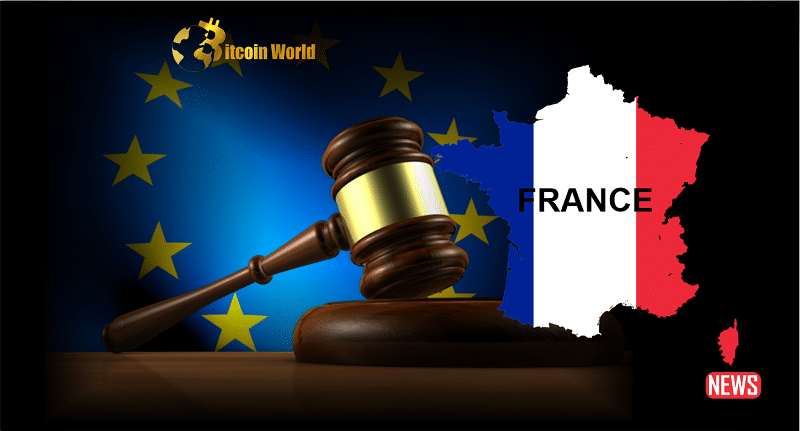Navigating the evolving landscape of crypto regulations can feel like traversing a maze, right? Especially with the EU’s groundbreaking Markets in Crypto-Assets (MiCA) regulation on the horizon. But hold on, there’s a beacon of clarity emerging from France! The French financial regulator, the Autorité des Marchés Financiers (AMF), is actively exploring a “fast track” option. What does this mean for crypto businesses operating in France? Let’s dive in.
France Welcomes MiCA: A Smooth Transition Ahead?
The AMF has openly embraced the approval of MiCA, signaling a proactive approach to its implementation. Think of it as France rolling out the red carpet for a well-regulated crypto future. In a statement released on April 21st, the AMF outlined its strategy for the 18-month transition period following MiCA’s approval. Their focus? Guiding French providers of digital asset services (PSANs) seamlessly into this new regulatory framework.
The “Fast Track”: What’s the Buzz About?
Here’s where things get interesting. The AMF is seriously considering a “fast track” mechanism. Imagine an expedited process designed to help already licensed crypto businesses in France align with MiCA requirements as quickly and efficiently as possible. This isn’t just about ticking boxes; it’s about ensuring these companies can smoothly operate under the new EU-wide rules.
Bridging the Gap: How is the AMF Making it Easier?
The AMF isn’t just proposing a fast track; they’re actively working to smooth out the bumps in the road. They’re focusing on areas where current French regulations and MiCA might differ. Think of it as a regulatory translator, ensuring everyone speaks the same language. Key areas of focus include:
- Crypto Company Fund Provision Restrictions: Ensuring clarity on the capital requirements for crypto firms.
- Conflict of Interest Policies: Establishing robust frameworks to protect consumers.
- Documentation Alignment: Streamlining the paperwork needed to comply with both AMF and MiCA rules.
This proactive approach aims to minimize disruption and make the transition as painless as possible for French crypto businesses.
MiCA’s Journey: From Vote to Reality
Let’s take a step back and look at the bigger picture. The European Parliament’s vote in favor of MiCA on April 20th was a significant milestone, celebrated by the crypto industry. However, the journey isn’t over yet. MiCA still needs the green light from the European Council in July before it officially becomes law. The current timeline anticipates MiCA coming into effect in early 2025. The ultimate goal? A unified and transparent regulatory environment for crypto assets across all EU member states.
France’s Two-Tiered System: A Head Start for Some?
Interestingly, France already has a two-tiered licensing system for crypto businesses. There’s a “simple” registration option with less stringent requirements, and a more demanding “enhanced” license. The French government favors the “enhanced” option, which is considered to be already closely aligned with the upcoming MiCA regulations. Could this give some French firms a head start?
Enhanced vs. Simple: What’s the Difference?
The stricter “enhanced” license is all about bolstering consumer protection. It includes more rigorous controls in several key areas:
- Anti-Money Laundering (AML) Rules: Stronger measures to combat financial crime.
- Customer Asset Custody: Enhanced security and protection for customer funds.
- Reporting to Regulators: More frequent and detailed reporting requirements.
- Risk and Conflict of Interest Disclosures: Greater transparency for consumers.
Currently, all 60 AMF-registered crypto companies in France operate under the “simple” option. They’ll remain under this framework until the transition to MiCA. However, any new cryptocurrency firm registering in France after January 2024 will be required to opt for the more robust “enhanced” license.
What Does This Mean for Crypto Businesses in France?
Here’s a crucial takeaway: Regardless of whether a company holds a “simple” or “enhanced” license, they can only offer their services within France during this transition period. Think of it as a local operating permit. However, once MiCA is in full swing, service providers approved under the new regulation will gain a significant advantage: the coveted “European passport.” This means they can offer their services across all EU countries without needing separate authorizations. This is a game-changer for scalability and market access.
Key Takeaways: Navigating the MiCA Transition in France
- France is proactively embracing MiCA: The AMF is committed to a smooth transition for crypto businesses.
- “Fast track” option being considered: This could significantly expedite MiCA compliance for licensed firms.
- Focus on bridging regulatory gaps: The AMF is working to align existing French rules with MiCA requirements.
- Two-tiered licensing system: The “enhanced” option provides a closer alignment with MiCA.
- European passport potential: MiCA offers significant benefits for firms seeking to operate across the EU.
Looking Ahead: What’s Next?
The coming months will be crucial as the European Council deliberates on MiCA. For crypto businesses in France, staying informed about the AMF’s guidance and the development of the “fast track” option is paramount. This proactive approach by the French regulator signals a commitment to fostering a well-regulated and innovative crypto ecosystem. The transition to MiCA might seem complex, but with clear guidance and proactive measures, France is positioning itself as a key player in the future of European crypto.
Disclaimer: The information provided is not trading advice, Bitcoinworld.co.in holds no liability for any investments made based on the information provided on this page. We strongly recommend independent research and/or consultation with a qualified professional before making any investment decisions.


